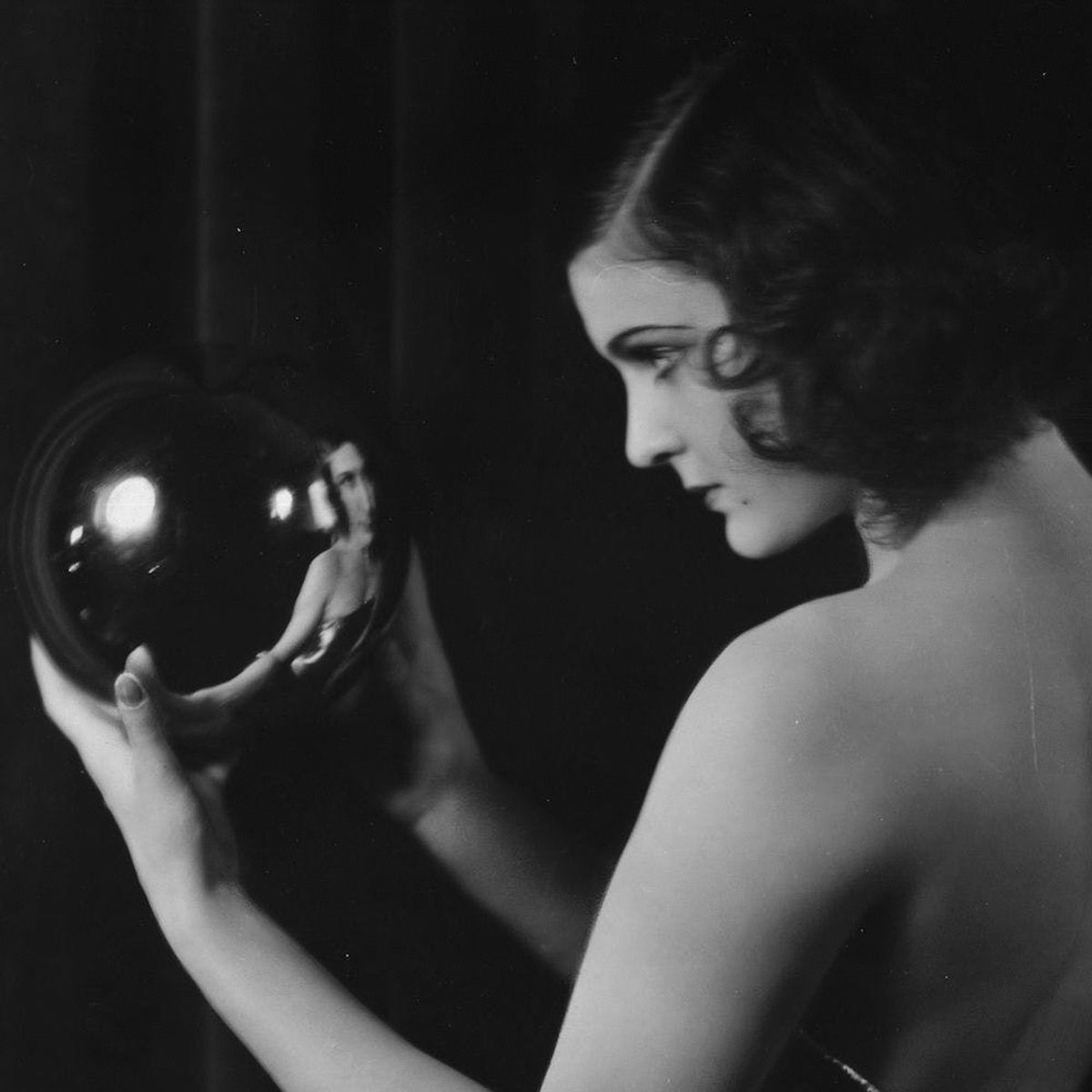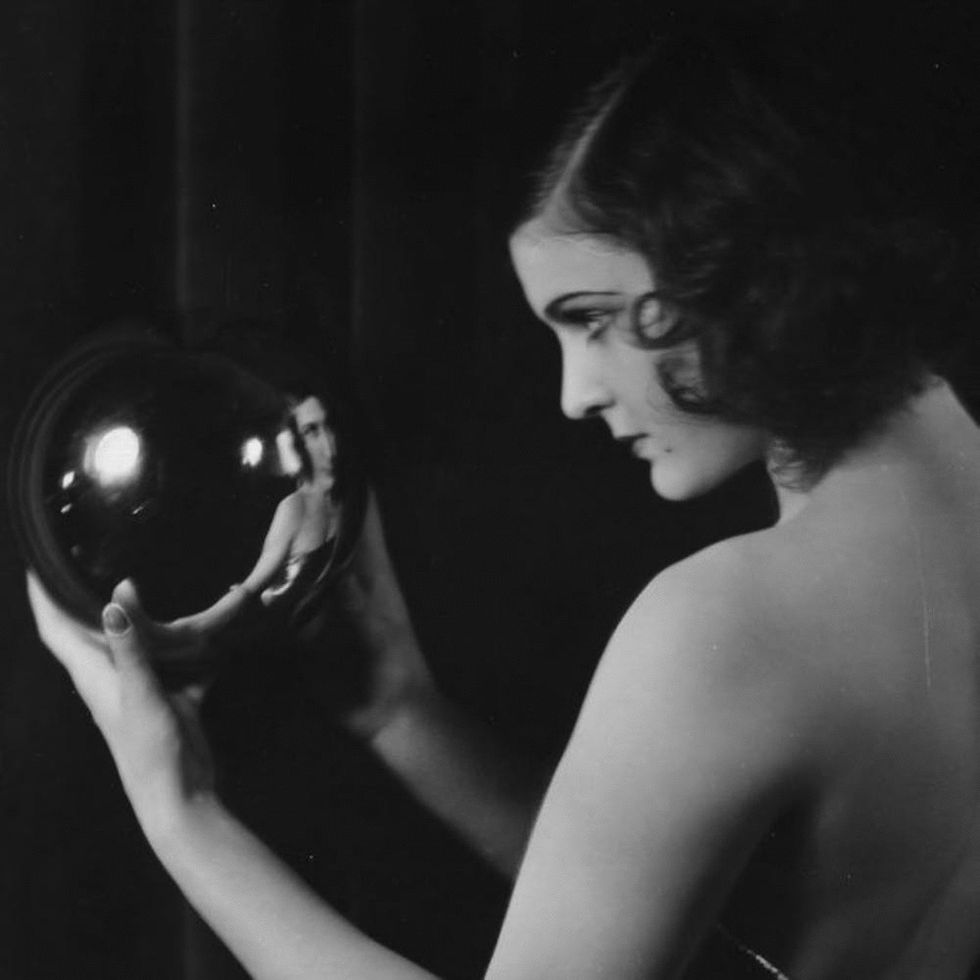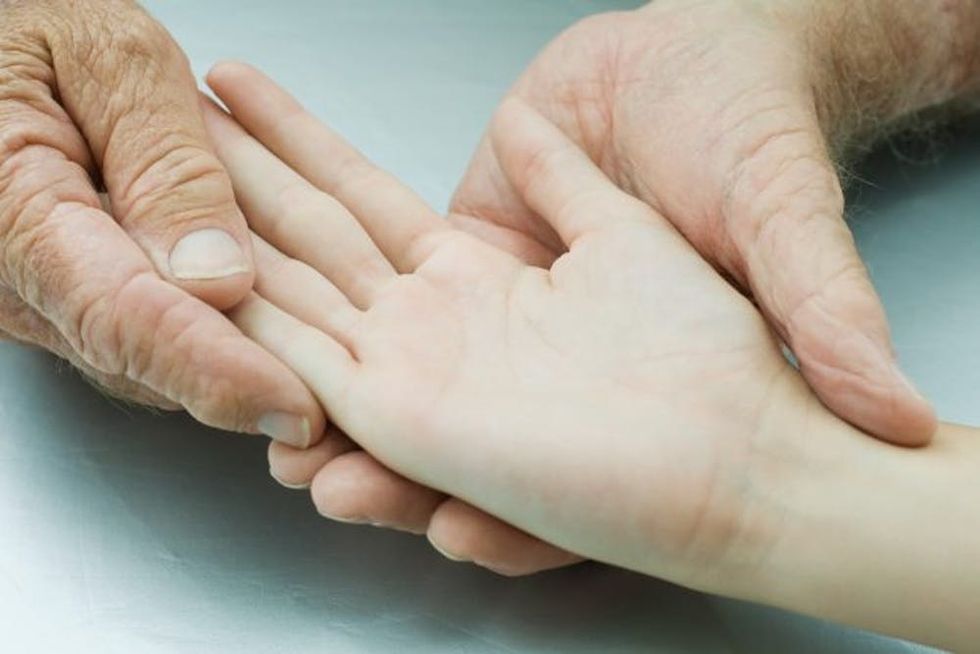What I Learned from a Fortune-Telling Stranger

I plunged deep into the train’s seat and closed my eyes.
My luggage was sprawled across all three cushions in the row. No one would disturb me for two and a half hours if I took up enough space. Bear climbed out of his dog carrier and into my arms — he was shaking, as any rational animal would inside a steel cage underneath Grand Central.
I pushed my headphones past my ear canals and checked to make sure the track was playing at full volume. Sometimes, it helps to drown out the noise, even if there’s long-term collateral damage.

I needed the Lumineers because they don’t write love songs. Or maybe they do, but their words mean urgency, desperation, and futility beyond clichés, and their textured sound makes that raw thrum that you can almost taste. It’s bitter but electric, and you’re glad to take the cyanide just to feel the hairs on your arms tingle.
Had I really texted James that I hate Robert Frost last night? I do, but that was the kind of line that made me mock pretentious college students who try to make a literary joke that falls flat for lack of wit. It was true that lately, the road less traveled seemed a farce, a parable about choice that gives too much credit to free will. But that wasn’t a brilliant insight. He must have thought I was drunk, and I was — not on vodka, but on hope. Hope made me the most hungover, but I couldn’t stop drinking it.
As “Sleep on the Floor” rotated through my playlist, a man slid through the cabin door. I took him for one of New York’s exotica — the kind of person you see on the street, whose quirky origin story you guess at for only a second before forgetting him entirely. Judging by his face, he was in his mid-50s, though the jury was still out on whether he had yet realized his age. His long salt and pepper waves reached down to an oatmeal pullover, and he looked like his destiny was to be a supporting character in a trash novel.
I like watching strangers, but I try not to look them in the eyes because that means I’m friendly, and I hate to mislead them. We are constantly waging a war against interpersonal contact in the 21st century, and as the man was easing into a row across the aisle, I thought this battle had been won. But then he noticed another passenger — the dog on my lap.
“Can I pet him?” he asked, standing up from his seat.
“Of course!” I said in a light-hearted but vacuous voice.
He smiled down at me, gently rubbing Bear on the head. His weight shifted toward one foot, like he was on the retreat, contented to return to his designated place across the aisle. But then, unprovoked, he seesawed back and plopped himself in the seat facing me.
“Where are you going?” he asked.
I had already put my earbuds back in, so I reluctantly removed them one by one in protest.
“Connecticut, to visit my mom. It’s my first time heading out there. Oh, I’m not a bad daughter or anything, she just moved here a week ago. How about you?”
“White Plains. My friend is letting me take his house for the weekend.”
“Oh cool. What do you do in the city?”
He said he worked at a TV network in Canada, but his boss had sent him to New York for a few months. Our small talk about Canada’s Prime Minister — and his American fan club — was abruptly cut short when my train-mate asked if I wanted to smoke hash.
“It’s 20 times harder than pot. It will blow your mind.”
This wasn’t the first mystery man to offer me unwanted drugs, but he was the first to do so in daylight, on public transit. Still, he had the kindest smile I had ever seen, and the casual way he spoke — offhand and tensionless — made me feel at ease.
I leaned forward slightly to feign closeness so he knew I wasn’t offended by his generous, if misguided, proposition.
“No, thank you,” I laughed. “When I smoke pot, I forget how to blink. My friends even worry about me when I’m on NyQuil. I don’t think I could deal with the intensity.”
He shrugged, then changed the subject. Who was I? he wondered. I had to tell him that I was no one — an intern, a college student living on the Upper West Side.
Harlem rushed by as we chatted. It actually felt nice, talking to a ghost, a man who would haunt my next half hour and then disappear. I could tell him my secrets because soon, he would just be a memory.
“Do you have a boyfriend?” he asked. I knew the question would come. It always does, if you’re young with breasts.
“No, not really.”
He looked personally offended. “Why not? You’re very pretty.”
I got nervous — not because I thought he was hitting on me; I could tell from the way he spoke that he was still in love with someone from his past. But I wasn’t sure why I was single, and so I couldn’t tell him.
“I don’t know, I have someone I care about deeply. We’ve known each other for two and a half years. He means a lot to me, but it’s complicated, and we could never actually be together.”
“Are you friends?”
“I’d say so. But he’s older, and he doesn’t really see me in a relationship way…”
“Do you want a relationship?”
No one ever asks me that. It’s always a presumption.
“I don’t know,” I admitted. It was a relief — to be honest.
He seemed unfazed. “That dog really loves you, you know.”
Bear was licking my hand, begging for attention. “He sees only the best of me,” I said.
One of my friends had told me she wished I treated her how I treat Bear. But that would be impractical because people are usually more complex and almost always pricklier than a pet who shows you nothing but loyalty and trust.
“Do you believe in fortune tellers?” the Canadian wondered, bringing me back into the moment.
I found his non-sequiturs to be discombobulating, but I appreciated them. Too many people think you have to stay on-topic, but what if there are far more interesting things than the weather?
“No,” I replied.
“Oh.” He looked disappointed, but not discouraged. He told me about his ex-girlfriend, who dabbled in prescience. Unsurprisingly, he revealed his own penchant for divination.
“Can I please see your hands?” he asked warmly.
I had gone to so-called psychics, mainly in jest, when my family had driven through New Orleans, and I knew how much they liked to prove their skill. Only a little flummoxed, I slowly stretched out my palms. They weren’t shaking like they usually do.
He glanced over them and his eyes looked sad, almost pitiful.
“Your markings on each hand are very different,” he said. “You’re bright, and you change who you are depending on who you’re with.”

“I do,” I said. There are probably only two people who have met the ‘me’ in my head, the one who comes out behind closed doors. One of them is my mother. But his words sounded like a line, a convenient catch-all. Don’t most people change a little depending on their company?
“There’s a lot of anger there,” he added. “I don’t know why.”
“Yes, I look like my mother, but I have my father’s temperament,” I laughed. Secretly, I was a little unnerved that he had detected that much. Most people think I’m bubbly, or at least polite. They never see the darkness under the surface, but he had picked up the scent during a 30-minute train ride.
“You have to let it go. You could be very happy, but you have to let the anger go.”
We were nearing White Plains, so he handed me a piece of paper to write down my number. We could grab a drink and talk more later, he said. I suspected that he probably would never contact me, and I knew if he did I shouldn’t respond. But some part of me wanted this specter to re-enter my life, if only for a while.
We were a minute from the station when he asked, “Have you ever been in love?”
My mind flashed to a man who had made me feel like I was enough, who had told me I was worth it, that I was different from all of the other girls he had dated. Who had told me he cared. I had fallen for him despite his flaws, and then he ghosted me — twice. I had scrolled through his Facebook photos and seen the women who came before me, seen the way he looked at them, the way he had looked at me. He had decided to forget them too, but he wasn’t able to completely delete their impression on his life because their images would always linger there, on Facebook, waiting for the next different girl to find them. My picture wasn’t there, so my erasure had been easier than all the rest.
My friend had texted me a screenshot of him on Tinder — he had visited New York last weekend. He was seven miles away, and instead of asking me to coffee, he sat somewhere swiping right because he’d rather have a one-night-stand than be with me. So I suppose I wasn’t that different after all.
“Yes,” I croaked finally, flatly, empty. Hurting.
The stranger nodded. “It’s just, despite the anger, you’ve got a lot of good in you. A lot of good. Especially if you like someone. And if you love them, you’ll do anything for them.”
“Yes.”
The train was pulling into White Plains. He grabbed me just above the knees. It wasn’t threatening, or sexually-charged, or boundary-crossing. I didn’t clench up with fear or resistance; he didn’t scare me. I felt the energy from his hands pulsating through my thighs, as if he were trying to transfer some of his hope to me, trying to tell me to keep fighting, and keep loving, and keep believing that humanity is complicated, but not always evil.
As the car jolted to a halt, he stood up, gave Bear a pat, and exited through the cabin doors. In that moment, I doubted I’d ever see him again.
That was okay, I thought, because we had journeyed together when I had needed him most. I was just a girl on a train listening to sad songs with a plastered smile when he had seen beyond my act. I had been suffocating under the pressure of disillusionment. I had been furious at myself for loving the wrong people. I had wanted to shut down. And in 30 minutes, he had restored my faith by reminding me that kindness is not transactional, that we don’t buy and sell good deeds to build up karmic capital. But if we’re lucky, we’ll run into a psychic on our way to see Mom, and he’ll put band-aids over open wounds, helping them heal.
(Images via Getty Images)



















